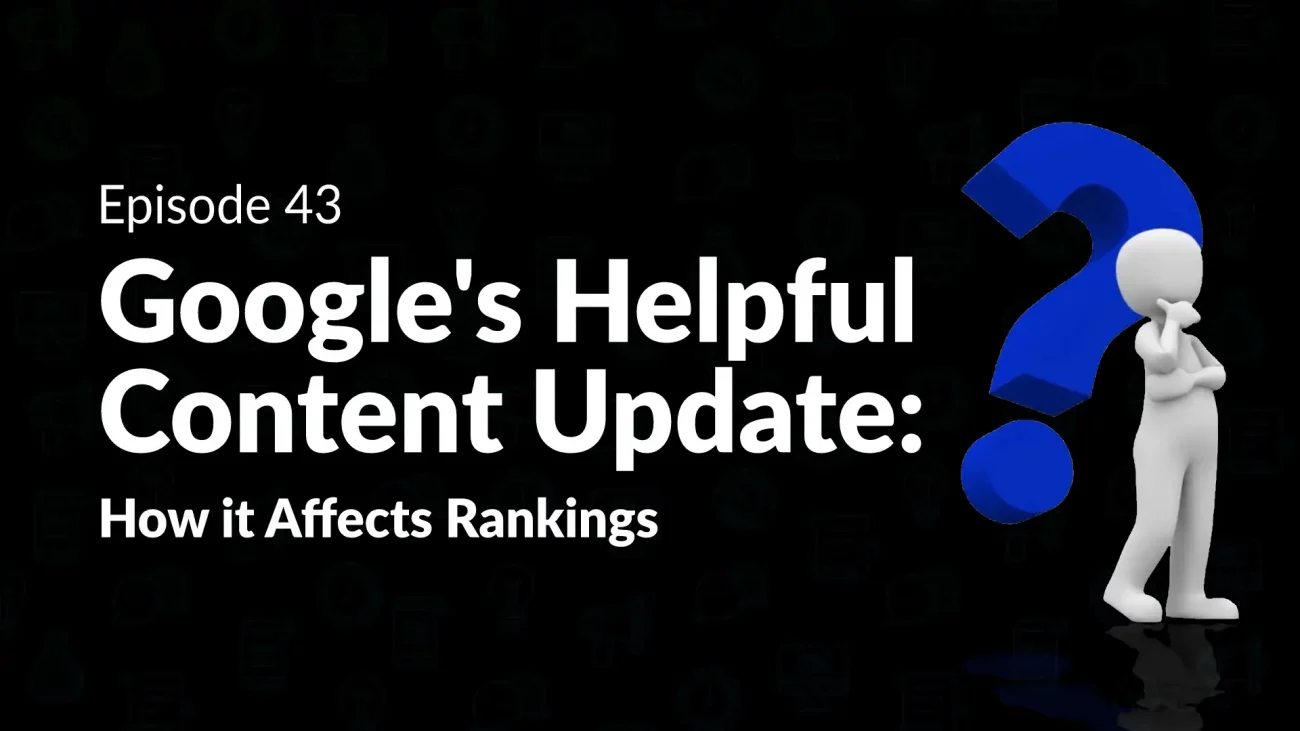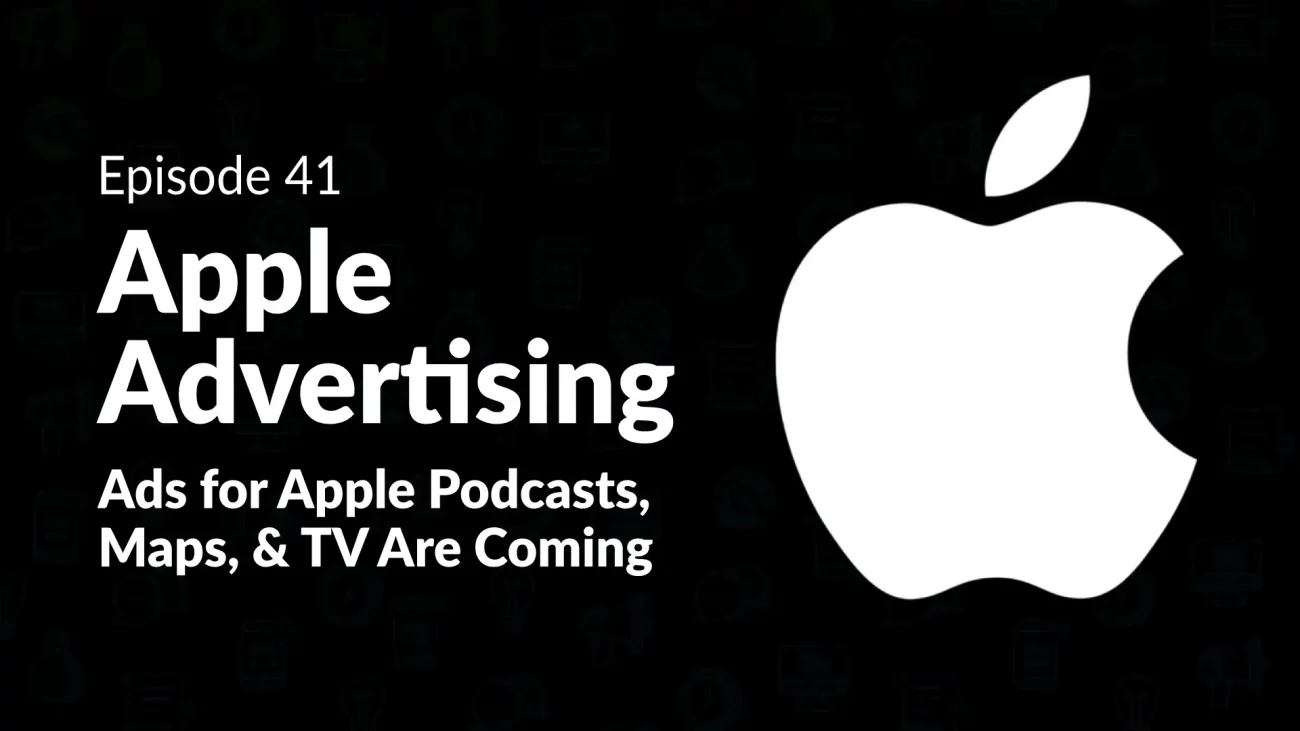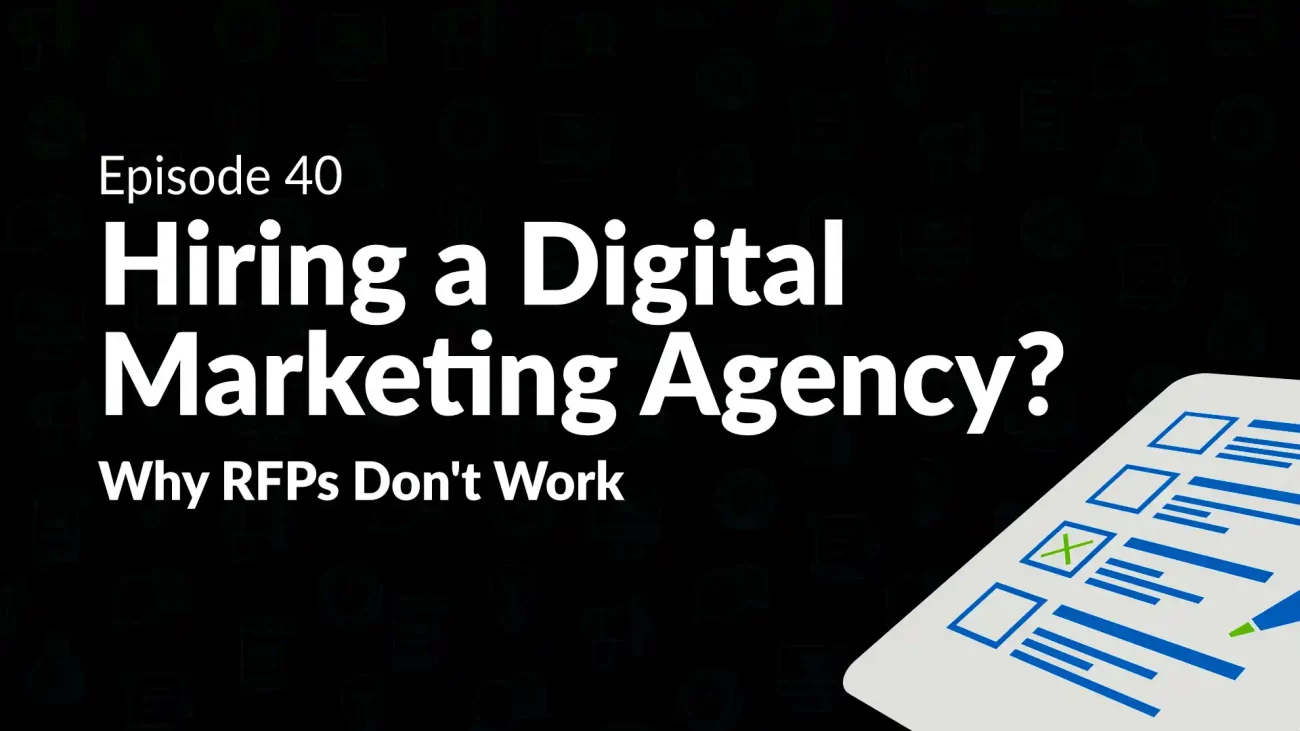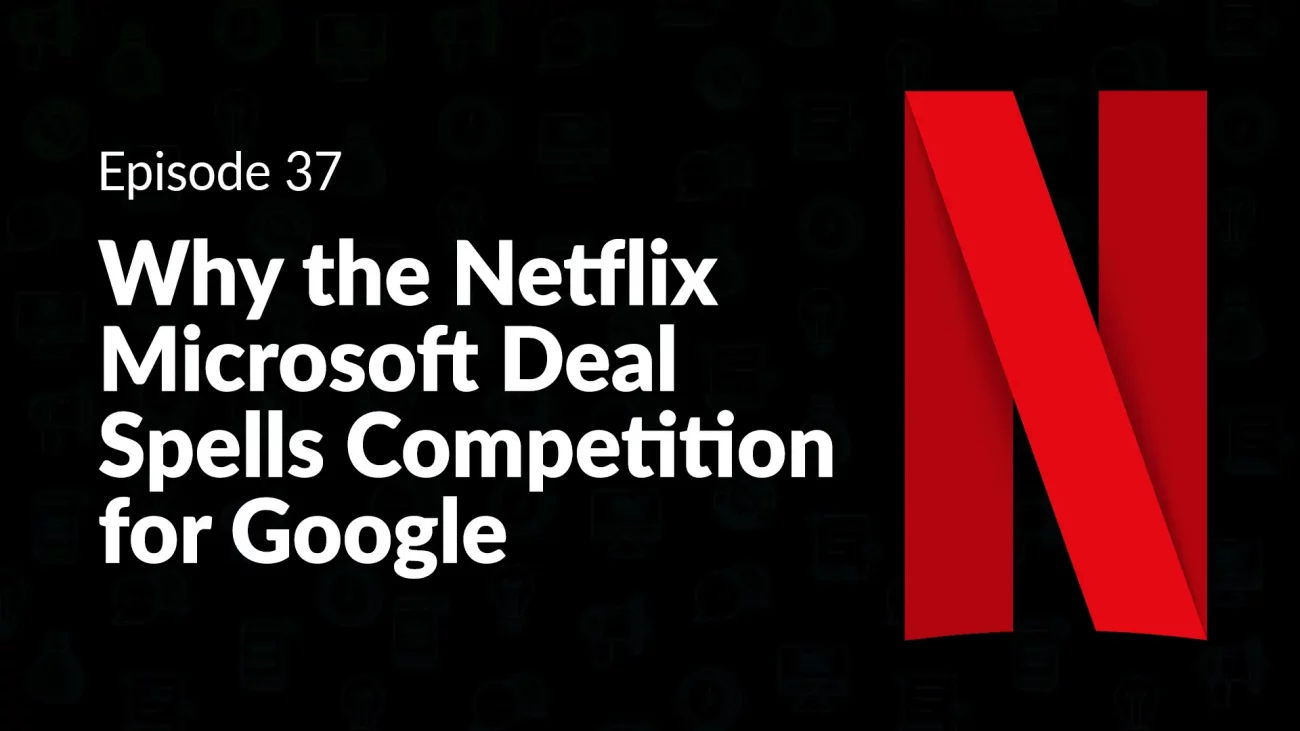Episode 38: AI and Advertising: When to Trust Automated Recommendations
The Matrix, The Terminator, and Google Ads have one thing in common: AI that can both help and harm you depending on the situation. Many advertising platforms in recent years have become more aggressive regarding automatic recommendations powered by machine learning. These suggestions ideally should help your campaigns, but in most instances they don’t. Smaller suggestions can be effective: platforms might tell you to remove an underperforming keyword or remove a negative keyword that prevents ads from showing for your main keywords. Despite our experience with invasive suggestions being useless at best, they should not be completely ignored. The ultimate goal of the machine learning behind these recommendations is to produce better results. Though infrequent, on occasion automated suggestions do find optimization opportunities. In many ways, platform representatives are not so different. Most of the time they echo the AI auto-recommendations, though this is not true with all reps. It is important to know how to distinguish good advice from bad advice while navigating the potential social pressures that may make you want to agree with a rep regardless of the story your data tells. Unlike auto recommendations, there are several unique benefits that reps provide, including access to inside information. It’s important to remember your goals and the goals of the advertising platforms may not align. You (or your digital advertising agency) are ultimately responsible for getting the most return on your ad budget.
In this week’s Digital Marketing Mondays, Hans and Devin discuss how to navigate recommendations from advertising platform AI and representatives to best optimize your campaigns.
Transcription:
Devin:
You’re listening to Digital Marketing Mondays. Each week, we bring you new and exciting content from around the marketing industry and help give you, the marketer, insights into what’s happening. We’ll offer our advice and share some takeaways to help you develop better strategies for your marketing. Ideally, this will also help you improve your ROI as well. So with that, let’s tune into this week’s episode.
Hans:
Good morning, Devin.
Devin:
Morning.
Hans:
I’ve got something on my heart, and it’s a topic I’d like to ask you some questions about because I think you’re more familiar with it than I am. We do a lot of pay-per-click advertising on a variety of platforms. Google, of course; LinkedIn, Facebook, Instagram, Bing ads, Snapchat. There’s a bunch of different platforms that you can advertise on. And in my experience we’re finding that platforms are often offering advice to the advertiser. “Hey, you should do this. You should do that. You should whatever.” Sometimes they actually will cancel an ad for example, or disallow an ad if it violates their standards. I’m not talking about that. I’m really talking about advice. Like, “you should increase your budget,” or “you should try a different keyword, and here’s what it is” or things like that. Things that are more advisory in nature. And I’d like to ask you, first of all, which platforms tend to be the ones that do that, that give you advice?
Devin:
Yeah. So at this point, it’s most of the big ad platforms that are now offering some type of account manager, account rep, something in that nature as a direct point of contact to work with the ad platforms. And every ad platform varies. And honestly the criteria can be sometimes a little more strict than others.
The other thing that I’ll point out is that if you’re spending a low amount in ad spend every month, say five grand or less on most of these platforms, you may or may not end up with a rep. Or if you do, it’s probably going to be a less seasoned, less experienced type rep. But when you start getting up into 10, 15, 20K a month, or certainly more, that’s when you’re going to get typically more experienced reps with more years and tenure at those companies, they work with other companies similarly. And unfortunately, it should be noted that pretty much every ad platform at this point shuffles their account specialists or their account reps, seems like every month, but it’s really every quarter at this point. So don’t hang your hat on building any form of a relationship with these folks. Unfortunately, they’re all going to go away eventually.
Hans:
Huh? Interesting, interesting. So below a certain threshold, and I guess it depends on the platform, you’re not going to get a dedicated rep.
Devin:
Yup.
Hans:
So let’s talk about the advice the reps give you. And I understand there’s also algorithmic advice. Things will pop up. Suggestions will pop up in your ads interface and say, “hey, you should do this.” So it’s not even involving a human in this case. It might have been written by a human. We don’t know. But it seems to be driven by AI or something like that. So let’s talk about what types of advice we get, and then I’d like to zero in on, should this advice be followed? Is this good advice? Is it bad advice? Is it a combination? How can you tell? That kind of stuff.
Devin:
Sure. So as you pointed out, there’s two types of advice that you can get. One is from a rep or one is generally algorithmically determined by the ad platform. But it usually comes in the form of a notification, or some type of banner, or in the case of Google Ads, a whole recommendations tab that you get in the ad account, that then has the algorithmically generated recommendations. Let’s start on that one because I think that’s a pretty easy one to dissect. Generally speaking, with every recommendation that they have, there would’ve been machine learning happening in the background that tries to make a recommendation based on what that machine thinks will help improve the performance. 9 times out of 10, the reality is those recommendations are generally going to be related to things such as increasing your budget, putting more ad dollars towards specific audiences, or testing new keywords, things of that nature. 9 times out of 10.
Hans:
Spend more money is the underlying theme there.
Devin:
Yeah. And whether you want to assume it’s nefariously motivated or not, the ad platforms are never going to recommend you spend less. Let me put it that way. So it definitely comes off as being nefarious and self-motivated in nature. So there are some of those recommendations that we at Market Advantage tend to agree with as well, such as simple things I would consider, like keywords that are not serving inside of an ad group. Haven’t had any impressions for months. Obviously those can just be paused. And I appreciate that. Or if there’s a negative keyword that is blocking one of your primary targeted keywords in the ad group from serving, that’s another great example of one. Either remove the negative or you pause the targeted keyword in the account. So I generally agree with those and to some respect, I think even just allowing Google to automatically update accounts now with those types of changes, I don’t have as much of an issue with.
But where I do have an issue is when it recommends changing bid strategies, when it recommends giving more dollars on certain days, or things of that nature, that’s when I really start to cringe. And that’s where I would typically suggest for clients who don’t implement those types of strategies, because they’re not always going to produce good results.
But I’ll point out too because I think in the interest of fairness, the machine learning is trying to provide the best recommendation it can there. So if you think that there’s any grain of truth in some of that, run a small test on it. Turn on that strategy for a week and watch what happens. But 9 times out of 10, you’re going to see your costs are going to go up, your conversions are going to stay flat or not really see huge improvements, or your cost per click is going to go through the roof, your conversion rate plummets to the floor. There’s going to be a number of things that could potentially happen. So I think, I say if you are brazen enough to test Google’s AI and machine learning, then go ahead and try it. But I would say be very cautious, keep a very close eye on it, and I would say we strongly recommend never ever let these automated strategies get auto-applied or run on autopilot because they will absolutely run away with your money.
Hans:
So trust and verify, and having good analytics so you can really see what’s happening as a result of a change that is made is very important. We should back off here a little bit and say that the objective of the advertiser usually is to generate either leads or awareness of a certain quality. The higher the quality, the better; and the more leads the better, and the lower the cost, the better. Those are generally the parameters, we’ve talked to thousands of clients and that’s pretty much, they’re all in agreement on that. The objective of the ad platform is not necessarily to make you successful. Now, granted, if they make you successful, you’re going to continue spending money. So there is an overlap of objectives there. Long run, the ad platform, they want to make as much money as they can. And if they can get you to spend, especially if you’re ignorant about testing and measuring, and you think this is just something I gotta do, and I’ve got the budget, so I’m going to spend it, they love advertisers who have budgets that are use it or lose it kinds of budgets.
And there are companies, I’ve worked in the corporate world, there are companies that kind of do that kind of thing. So if you want to throw money at Google, it’s easy to throw money at Google or LinkedIn or Bing Ads or anybody else, Facebook. But if you want to really make each dollar count, then that’s up to you and not the ad platform. And sometimes the advice they give is not necessarily in alignment with your objective. Yeah, what about working with reps? Have we closed this subject by the way, first of all?
Devin:
Yeah. So in the recommendations tab, in any of those platforms, they’re going to be machine learning driven. So now pivoting over to reps. I think the reality is that the reps are just the far more vocal mouth pieces for the machine learning, that are more persistent, and you can’t dismiss them necessarily, or you can’t just hit the notification that says, I don’t like this recommendation. No, thank you. They’re going to be the people that really follow up and try to make sure that you are implementing the recommendations or the strategies. And depending on the rep, depending on the platform, they can either be pretty relaxed about it, or they’re going to be super in your face to make sure that you’re implementing those types of recommendations on a regular basis to keep up recommendation scores or whatever it happens to be. But 9 times out of 10, they’re just mouth pieces for whatever the machine learning is telling you to do.
With rare exception have we seen that an account rep will do that. We’ve had some reps in the past working primarily on Google, but even on LinkedIn as well, that really try to dive in, ask the meaningful questions. And in some cases, even agree with agencies/advertiser goals, which is, be as cost efficient to drive results as possible, typically. And it can be agreed upon. I will say one thing that I love right now about account reps. So not to totally bash on account reps. I think they can definitely provide some additional support and insights that recommendations can’t. With LinkedIn, if you’re in a certain tier with account reps, you can feed them the names of competitors and then they can actually go look at what those competitors are spending on advertising, where they’re spending it, how many leads they’re generating.
Now keep in mind, it’s a two-way street as well, because those competitors can do the same thing for you as an advertiser, but that’s super interesting and that’s something you certainly couldn’t get from the platform by itself. Even with Google, as an example, if you have an account rep with enough pull, you should be able to get access to different beta features, which is really fun to play with. And certainly I think with all of them, I would consider actually the core strategic advantage is that you get a direct line of support in the event something does come up. Because I think we all know that any form of chat support with those ad platforms is all outsourced and all useless. So you’re going to waste hours and hours of time trying to chat with people that don’t understand this stuff clearly. And they’re just being trained to speak in a call center. So having that direct line of support with an account rep is definitely meaningful.
Hans:
So one we occasionally get, and I’m sure our listeners do too, if you’re running ads on any of these platforms. You occasionally get an email from somebody purporting to be from Google, LinkedIn, Facebook, whoever saying, “hey, my name is whatever. And I’d like to talk to you about this account.” And so it sounds like your recommendation there would be yeah, definitely respond, definitely allow the conversation to happen. Is there any downside? Could you get a bad rep that could harm you? Or I suppose you could, but has that ever happened in your experience? Or is it usually the worst thing that can happen is you get bad advice, you say no thanks, and you move on, and it’s no help?
Devin:
Yeah. There’s certainly a social pressure, so to speak, especially if you have an account rep that’s exceedingly pushy towards doing specific things that you don’t feel are in your best interest. They’ll be fairly persistent about that, and that’s why I suggest if you have access or you’ve been invited to speak with an account rep, I do recommend it. But the thing that I also recommend is essentially your answer to every suggestion that every account rep ever has is “thank you very much. I’ll take that into consideration.” That should be your answer. You don’t want to promise them anything. Don’t give them an inch because they’ll take a mile. And certainly whatever you do, do not let them implement anything on their end. You go ahead and control it. And the reason why is not to say they will screw up in the process. But I think as an advertiser, you should be the one in control of the accounts and what’s happening in there. I think it’s always good.
Take the free advice, see what they have to say, take it with a grain of salt and understand that not everything they are suggesting will be exactly as it happens. They’re going to say, “Oh, if you spend $10 more a day, you’re going to get 3 more leads or get 50 more clicks to the website.” That in theory sounds great, but the reality is there’s going to be some other impacts in the account that you don’t foresee and that they don’t tell you and that you’re going to need to be mindful of. That’s definitely a big consideration there.
So to reiterate, if you end up taking the calls with the account reps, say, “thank you very much. I appreciate the advice. I’ll take that into consideration.” That should be your line verbatim. And in that case, just keep being persistent. Don’t let the social pressure or the awkwardness of not taking their advice or turning them down dissuade you at all. They talk to hundreds and hundreds of clients in a week. They’re used to it. So don’t feel bad. Take the advice if it’s good. If it’s not, gently push back and I think you definitely can get some value.
Hans:
Yeah. Great. All right. Terrific. Well, that’s great. So yeah, that kind of covers the topic. But thanks for that. I think that’s useful advice. Just remember your objectives are not always aligned with the objectives of the ad platforms. Keep that in mind as you go and be smart about it. I’ve heard there’s been very good advice given sometimes that has really made a very positive difference, but not every piece of advice is good advice. And it’s your money or your client’s money. Let the buyer beware. Thanks Devin, that’s been really good. Thank you very much.
Devin:
Yeah. Thank you. Good topic.
Thank you so much for tuning in. We really appreciate you taking the time out of your busy day to engage with our content. Whether you’re watching on YouTube or subscribed on our podcast apps, we appreciate you taking the time. Make sure to leave a comment down below and let us know any feedback that you have for us. We’re always watching the comments and engaging in any way that we can. So if you find this content useful, also make sure to subscribe or give it a big thumbs up. We appreciate it. Thanks so much.









